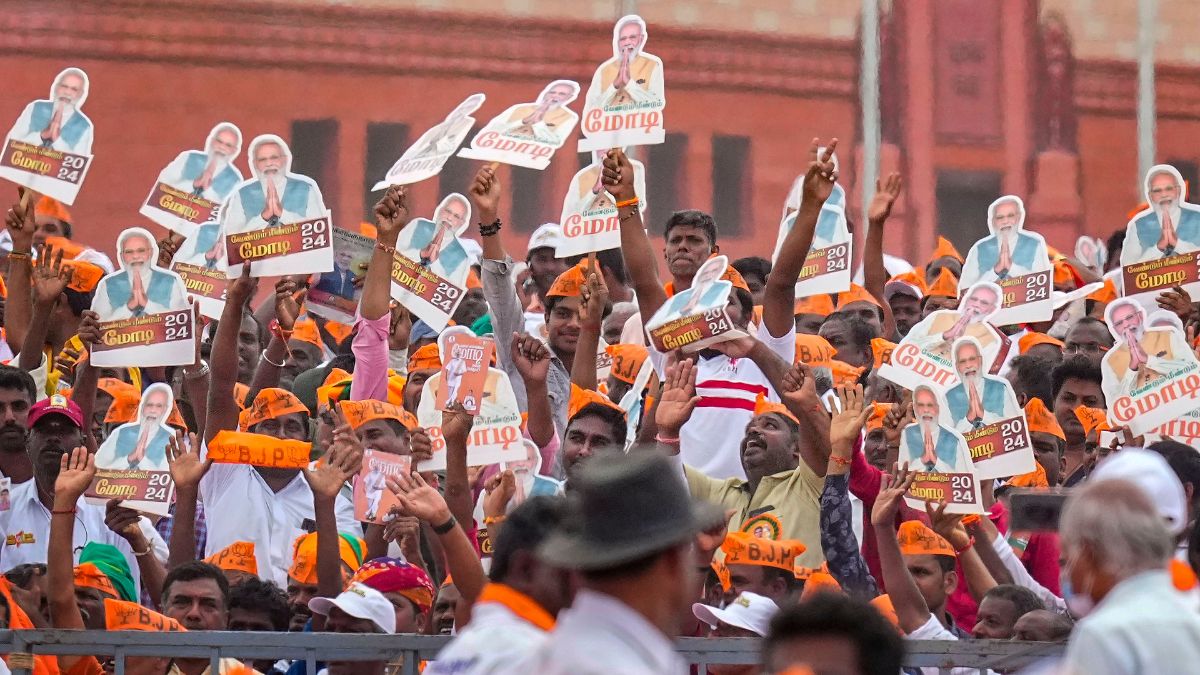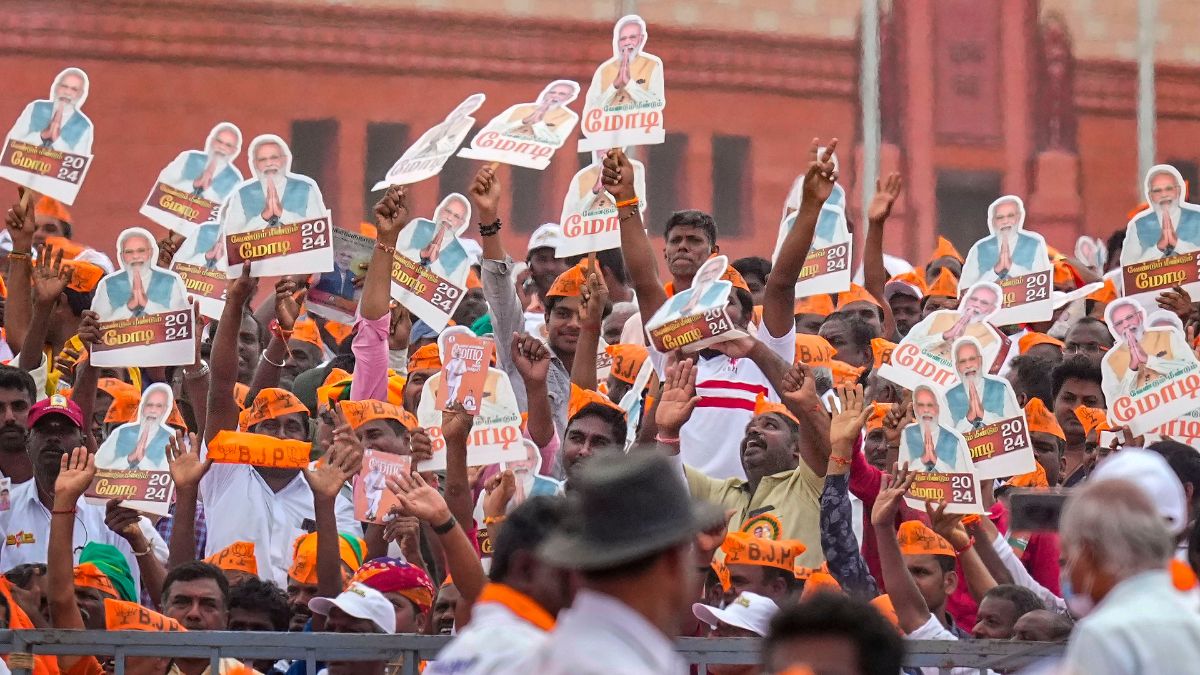The political turmoil in Tamil Nadu seems to have finally subsided, albeit temporarily. For now, Chief Minister E Palanisamy, of the AIADMK, seems to be in charge of affairs. Though it could well be a lull before another storm.
After Palanisamy won the trust vote in the Tamil Nadu Assembly, the opposition DMK petitioned the Madras High Court to cancel the vote. The high court adjourned the hearing of the petition till the week starting 27 February. In case the trust vote is cancelled, the focus will again shift to the behaviour of the governor of Tamil Nadu vis-à-vis asking for a new trust vote and government continuation or formation.
So let’s take advantage of this relatively placid, if albeit transient, scenario and look back at what happened around the issue of chief ministership of Tamil Nadu and the role played by the Governor C Vidyasagar Rao in the turmoil.
With a guilty verdict against VK Sasikala in the disproportionate assets case , the governor’s stand in not inviting Sasikala to form the government or prove her majority has been hailed in certain quarters as evidence of his farsightedness . The governor might have been farsighted because he set his sight on things that are far from his brief. And that is a huge problem in a federal democracy like the Indian Union.
After O Panneerselvam resigned from the general secretary position of the AIADMK, Sasikala took over. Panneerselvam thereafter tendered his resignation from the chief minister’s post, according to the unanimous (which now appears to be not unanimous, but a huge majority) wishes of the legislature party of the AIADMK in the Assembly.
The governor accepted his resignation and Panneerselvam was asked to continue as the care-taker chief minister of Tamil Nadu till a successor was appointed. The AIADMK wanted Sasikala to be the new chief minister and a stupendous majority of MLAs of the AIADMK elected her as the leader of the legislature party. None of this was illegal.
At this point, Panneerselvam rebelled against the AIADMK party leadership and claimed that actually most AIADMK MLAs were secretly supportive of him. He also claimed that Sasikala and her associates were holding AIADMK MLAs in certain locations against their wishes.
This was a charge of kidnapping. If it was true, then Panneerselvam was fully within his right to send in police to these locations and rescue the so-called ‘kidnapped’ MLAs. He did no such thing, but continued to parrot the kidnapping theory.
His bluff was called when even after Sasikala’s arrest, the AIADMK legislature party, ostensibly freed from the clutches of Sasikala, did not chose Panneerselvam but rallied behind Palanisamy, the successor chosen by Sasikala. In the trust vote, 122 MLAs voted for the AIADMK government led by Palanisamy. The Panneerselvam camp could garner only 11 votes.
Palanisamy showed he commanded absolute majority in the Assembly and a stupendous majority among AIADMK MLAs. Through all of these events, what has been most troubling is the undemocratic behaviour of the governor of the state.
It appears that Rao essentially chose to suspend democracy in Tamil Nadu for quite a few days and continued with an unrepresentative and hence undemocratic regime instead. After Panneerselvam’s resignation, Rao was handed the signed list of MLAs supporting Sasikala as Chief Minister. This list constituted a majority of MLAs in the Assembly.
Sasikala, at that point, was not barred from holding office. Under which law or article of the Constitution did Rao not invite the person who had the support of the majority in the Assembly to form the government? A majority of MLAs of Tamil Nadu represents the majority viewpoint of the people of the state in a representative democracy.
From where did Rao get the power to deny the people a government? A state without a representative government is essentially an autocracy. Why did the governor continue in this situation? He chose to stay away from Tamil Nadu for days altogether when there was essentially a dangerous power and governance vacuum in Tamil Nadu. Essentially, a governor chose to deny people their chosen government. Who does he think he is?
The governor is not elected by the people of Tamil Nadu. He doesn’t represent their political choice. The MLAs of Tamil Nadu are elected by the people. They represent their political choice. Thus, when a governor denies the chance to form the government to the person elected by a majority of MLAs of Tamil Nadu as their leader, an unelected person denies the people their right to exercise their political choice through their elected representatives.
Whether Sasikala was guilty or not, that was for the courts to decide. The governor is not the court. It is not his job to decide or predict whether in 10 days or 10 weeks or 10 months, someone might get convicted. There is no article in the Constitution that says that a government or a chief minister has to have some minimum tenure or that if someone has a possibility of conviction in a future date, then that person cannot be appointed as the chief minister.
Then, on what ground did Rao deny a representative government to the people of Tamil Nadu at that point? His job was to ascertain who commanded a majority in the Assembly. He was presented with a list of MLAs representing the majority of the Assembly. Did he suspect that the list was false? In that case, he could have asked for a parade of MLAs. Sasikala had offered to do that, given Rao’s intransigence.
In any case, Palanisamy’s trust vote shows that Sasikala’s list was not fraudulent. The governor simply overruled the majority opinion of the people of Tamil Nadu. Because he could. It is immaterial whether he was right or wrong. The relevant legal and constitutional question is, is that his job?
Does the governor of a state, not under President’s Rule, have any right to deny the person chosen by a majority of MLAs to form the government, when no article of the Constitution disqualifies that person? That is the real question that Rao needs to answer.
Who does the governor represent? Time and again, it is seen that the governor represents the Union government. Thus, we see the governors selectively toppling only those state governments that are ruled by parties not in power at the Centre.
The most recent instance of this shameless act happened recently in Arunachal Pradesh. Even more recently, the governor of Tripura refused to read passages critical of the Union government – a House speech that is prepared by Tripura’s Council of Ministers and thus represents the majority viewpoint of the people of Tripura.
Who is the governor to ignore the majority viewpoint in a representative government? The governor is not sovereign. Not even the President of the Indian Union is sovereign. Only the people are. That’s what makes the Indian Union a republic and not a monarchy.
There is reason to believe that the charges of partisanship against the governor of Tamil Nadu are not without substance. Rao, a veteran of BJP-Jansangh for more the 40 years, gave ample opportunity to anti-AIADMK forces in Tamil Nadu to try to break the party. The party, which has fished the most in these troubled waters, is the BJP, whose support for the Panneerselvam group was quite open.
That is not surprising. Panneerselvam, in his brief regime, bartered away Tamil Nadu’s state rights when it agreed to the UDAY scheme, something that J Jayalalithaa had opposed on grounds of encroachment on federal structure. Thus, the Centre had found a pliant partner in Panneerselvam . Their horse did not win the race, even though the Centre tried its best through its man in Chennai.
It’s amazing that there exists no method available beforehand to a state government and hence to the people of the state to stop a Centre-deputed governor from doing what he did in Tamil Nadu. This is a disease common to all over-centralised multi-ethnic rashtras. These entities show who is sovereign by choosing any of their own made-up rules, which they can then violate.
Who is the governor of a state? This character is New Delhi’s agent in a state/province. This character even has discretionary powers – which do not flow from the wishes of the state’s people but typically from the wishes of the Centre.
What is the origin of this position? When British acquired one sovereign area of the subcontinent after another, after having amassed some serious amount of territory (which would go on to become the Indian Union and Pakistan in 1947), they appointed some loyal and trusted dalal of centralised imperial rule, to keep the acquired areas and provinces ‘in check’.
These positions had various names in various British acquired and controlled territories in the subcontinent. The 1935 Government of India Act had provincial governors with huge discretionary powers – natural for a colonial Centre when dealing with limited but representative native provincial government.
The post-partition position of the governor is, in a long range sense, the continuation of that office. What change did governorship undergo from transition from the Union Jack to Tricolour? How similar are the pre-Partition dalals of British imperialism and the post-Partition agents of New Delhi?
Firstly, post-Partition, they were non-white. Also, they answered to New Delhi and not to London. But, as before, they were almost never from the area which they were appointed to ‘govern’. They also have often done what their pre-Partition counterparts did – carry out the rule as per the wishes of the Centre, typically when democratically elected governments of states does things that New Delhi’s sarkar bahadur do not like.
The office of the governor is an example of an anti-people undemocratic relic from the British rule. Must we remind ourselves that what happened on 15 August, 1947 was a transfer of power, its repackaging as ‘independence’ notwithstanding?
People of a state, Tamil Nadu included, are neither stupid nor apprentice-citizens. They are adults with inalienable rights of democratic representation. Swaraj is a process, not an event. Abolishing the post of the governor will be a step in that direction. It is not so much a ‘bad apple’ problem but a poison tree issue. Why should unelected governors exist at all?


)




)
)
)
)
)
)
)
)